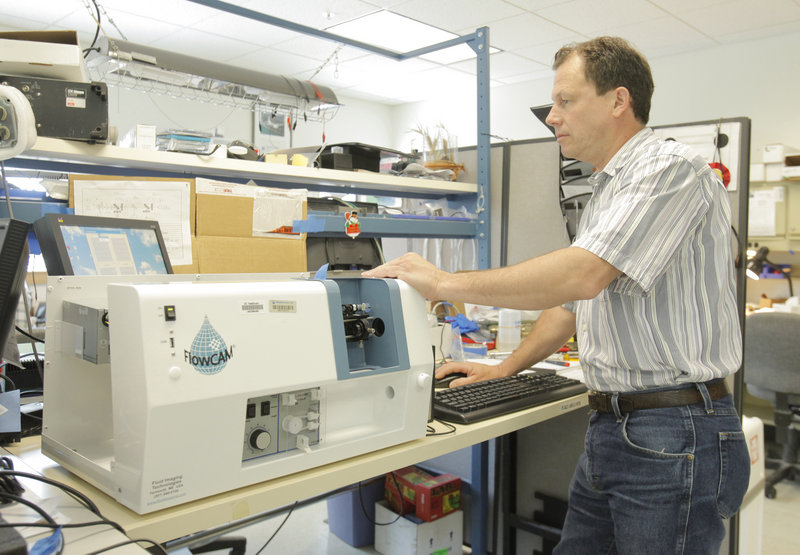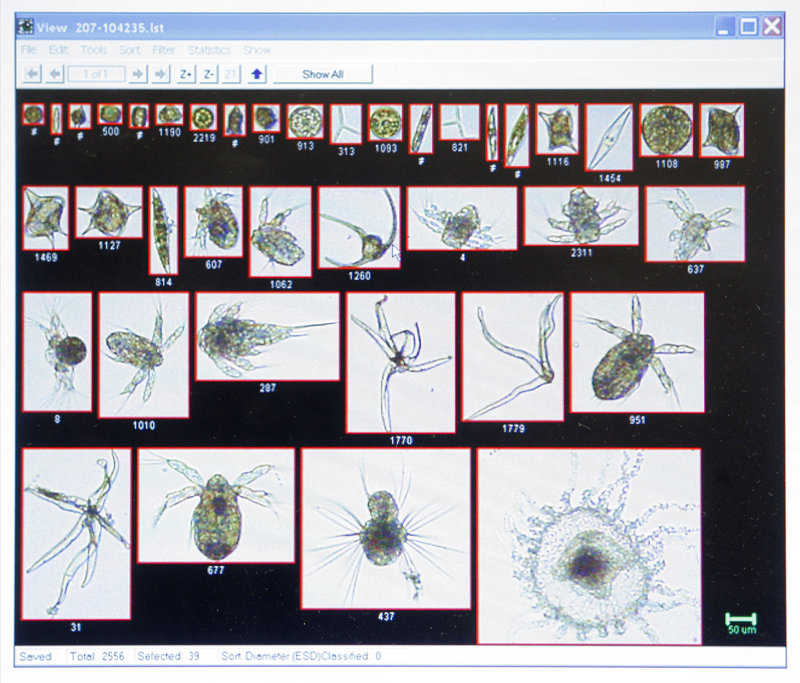YARMOUTH — Kent Peterson likes to point out that oil fields were formed over eons from deposits left by ancient algae.
These days, his company, Fluid Imaging Technologies, is selling a machine that helps speed up the process. It’s called the FlowCAM, and it’s used by companies and research groups to study algae used in the production of biofuel.
“Here’s a company in Maine playing its part in delivering a renewable energy source,” said Peterson, chief executive officer and co-owner of Yarmouth-based Fluid Imaging, which has 22 employees. “Globally, this business will grow a lot.”
FlowCAM is a “particle analysis” device roughly the size of a desktop computer. (Fluid Imaging also sells a portable model.) It snaps digital images of particles in liquids and measures the size and shape of particles, which can be studied on a computer using particle analysis software.
FlowCAM was created about 15 years ago at the Bigelow Laboratory for Ocean Sciences in Boothbay Harbor, and was initially used to study plankton in ocean water.
In 1999, FlowCAM’s developer, Chris Sieracki, founded Fluid Imaging to sell the product to other oceanographers.
A few years later, Fluid Imaging expanded into what Peterson calls “industrial” markets. Flavor and fragrance companies use FlowCAM to analyze ingredients, as do major pharmaceutical, plastics, abrasives and food companies, like Welch’s and Wild Flavors Inc.
Other customers are the U.S. Environmental Protection Agency, the U.S. Food and Drug Administration, the Army and Maine’s Department of Marine Resources, which uses FlowCAM to test for red tide, said Peterson.
About three years ago, Fluid Imaging began selling FlowCAMs to companies and researchers in the growing algae-based biofuel market, a segment of the renewable energy sector that Peterson calls a “huge opportunity” for his company.
Victoria Kurtz, Fluid Imaging’s assistant sales manager, said algae contains high levels of lipids – oils – which can be made into jet fuel, biodiesel and other biofuels.
She said biofuel developers use FlowCAM to identify the types of algae that contain the most lipids, and to monitor algae growth and health and detect contaminants.
In mid-May, Fluid Imaging announced that BARD Holding Inc. of Fairless Hills, Pa., will use FlowCAM at its new commercial algae production and oil-extraction plant in Morrisville, Pa.
Other biofuel clients are Synthetic Genomics Inc. and Sapphire Energy Inc. in the San Diego area, James Cook University in Australia, and Arizona State University.
John Ericsson, CEO of BioMarine Fuels Inc. of Gulf Breeze, Fla., and its nonprofit arm, the Gulf Marine Institute of Technology, called FlowCAM the best product of its kind.
Ericsson is developing a process to make fuel and oils from marine algae, and he uses FlowCAM to study factors that influence algae production.
“It gives you the cell count per milliliter of water, so we know the growth,” he said. “It gives you an instantaneous reading on how well the system is performing.”
Peterson said algae biofuel remains three to four times as expensive as gasoline but the industry is on the “cusp of economic feasibility.”
“A lot of people are experimenting and starting to commercialize (algae), and there is lots of investment” in biodiesel by oil companies, airlines and the U.S. government, Peterson said.
Last week, the U.S. Department of Energy announced an investment of $36 million in six small-scale biofuel and bioproduct development projects, according to a Department of Energy news release. The investments are part of the Obama administration’s effort to cut foreign oil imports and improve the efficiency of biofuel production.
As much as $2 million will go to San Diego-based General Atomics, which is developing ways to make algal oils, which can be refined into biofuel, more economically.
Peterson said government funding helps his business because companies and research organizations that receive funds may buy FlowCAMs, or pay Fluid Imaging to analyze samples. “That money will find its way to us somehow,” he said.
FlowCAMs cost $80,000 to $90,000 each.
Peterson declined to discuss Fluid Imaging’s yearly revenue, but said sales have grown every year for 12 years. He said that revenue gains were driven by sales to all types of clients – biofuel, industrial and research groups.
Peterson said Fluid Imaging hired three people in the last year and expects to hire more sales, customer service and laboratory employees this year.
Fluid Imaging has sold about a dozen FlowCAMs to companies and research groups that are involved in the algae-to-biofuel business, and 350 FlowCAMs in all since the company started, Peterson said.
This year, Peterson said, Fluid Imaging is marketing FlowCAM to international clients involved in algae-based biofuel. The company has already sold FlowCAMs to customers in 35 countries, most to oceanographers and industrial clients.
Staff Writer Jonathan Hemmerdinger can be reached at 791-6316 or at: jhemmerdinger@mainetoday.com
Copy the Story Link
Send questions/comments to the editors.





Success. Please wait for the page to reload. If the page does not reload within 5 seconds, please refresh the page.
Enter your email and password to access comments.
Hi, to comment on stories you must . This profile is in addition to your subscription and website login.
Already have a commenting profile? .
Invalid username/password.
Please check your email to confirm and complete your registration.
Only subscribers are eligible to post comments. Please subscribe or login first for digital access. Here’s why.
Use the form below to reset your password. When you've submitted your account email, we will send an email with a reset code.